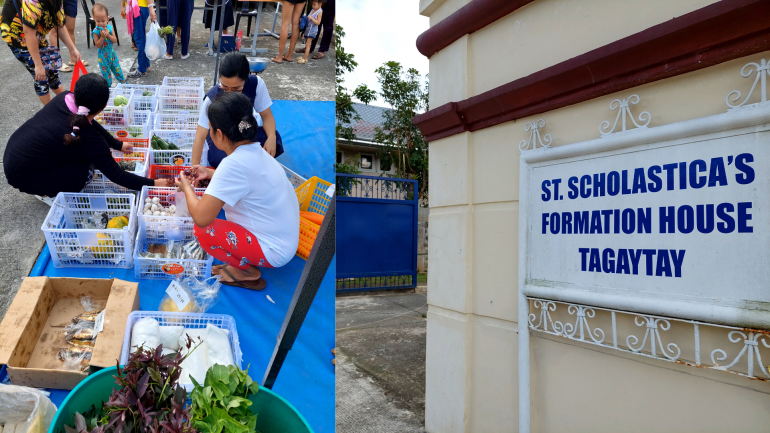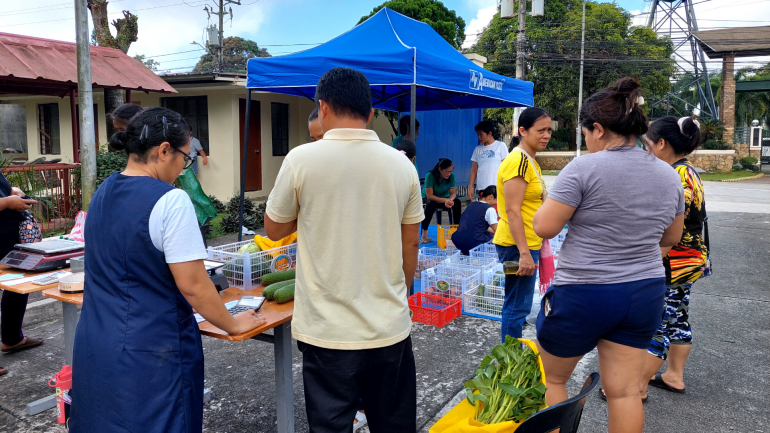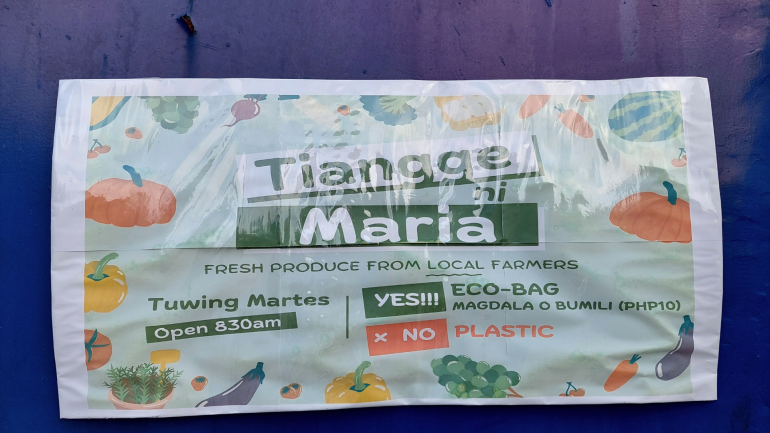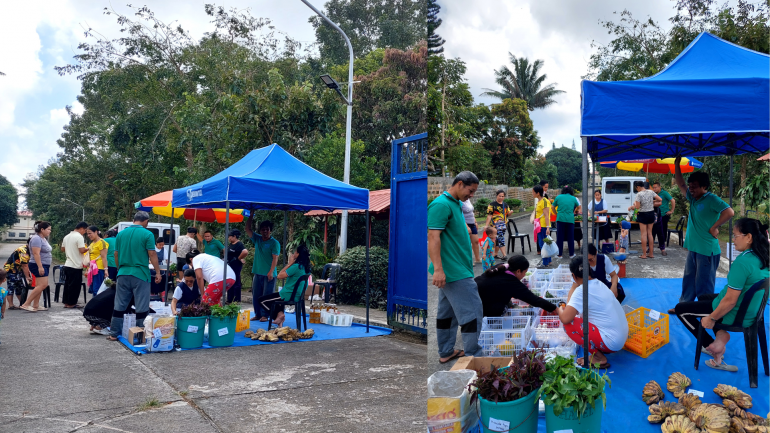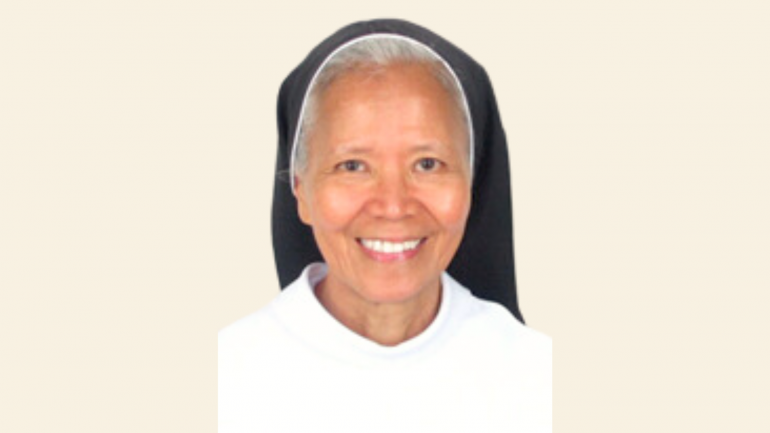Sisters’ community-based social enterprise serves both the poor and the rich
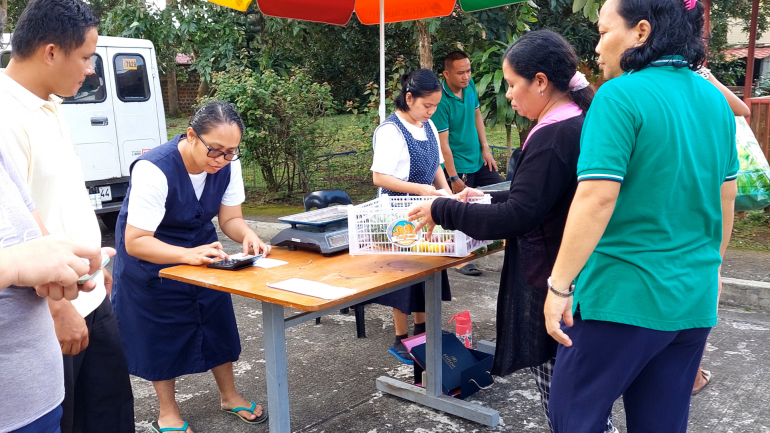
"Tiangge ni Maria," a community-based social enterprise serves as a bridge connecting small farmers to urban poor consumers by offering affordable, mostly organic produce.
A community-based social enterprise dubbed “Tiangge ni Maria” (open market of Mary) of the Missionary Benedictine Sisters of Tutzing (OSB) in Tagaytay City in Cavite province has been serving both the poor and the rich with formandees at the forefront, according to Joni Gail Morales, one of the novices.
This writer, on an early Tuesday morning, experienced how the “micro-mini social enterprise” gathered in joy within the compound of the formation house near the gate, the neighboring residents as they choose farm products from Tanauan town in Batangas province, mostly organic vegetables, at prices lower than those sold at the city market.
It was a prayer that opened the weekly bazaar, led by Sr. Mary Vincent Feliciano, OSB (Superior), to remind everyone that in everything in the bazaar, God may be glorified.
It was Sr. Mary Paul Baul, OSB, provided the concept of the enterprise - from a dole-out to connecting small farmer producers to urban poor consumers.
“Once a week, with at least three members of the staff, we go purchase directly from the farmers. Net earnings of the Tiangge are plowed back to rolling capital ensuring continuity of its service,” she said.
Beginnings
“The bazaar was an offshoot of the Formation House Community Project, a community pantry, which aimed to help the purok communities near house reduce their weekly food expenses, while farmers are able sell at a good price fruits and vegetables which are brought closer to the people,” said Morales, adding that the outreach program helps in their “awareness and understanding of the status, issues and concerns of the poor community living outside its convent walls.”
The sisters participate during their free schedules. “As we help with the cashiering or bagging of the goods, we engage the buyers, the poor, rich and working-class residents thereby forming familiarity from the conversations, initiating relationships , thus communicating a certain presence of Christ to others,” said Morales.
She added, the formandees “have learned the value of building relationships or being in solidarity with the plight of the poor, the value of social justice, stewardship for the marginalized and the environment, the value of caring, and the value of community that stretches beyond the convent walls.”
Initially, only three puroks or districts were reached by the open market, which were regularly visited by the formandees for their apostolate.
The set up also benefitted the larger neighborhood, including nearby religious congregations and residents of gated villages, said Morales.
Tiangge ni Maria" uses its earnings to support community initiatives, including a children's camp focused on values education and environmental awareness.
Benefitting the children
Twenty-four children (ages 7 to 14) of the market’s regular customers were gathered from June 12 to 14 this year in a three-day camp dubbed as the Camp of the Children of Mary packed with games for values education, animated Bible stories, an art class and an environmental clean-up drive within the barangay, along Magallanes and Bonifacio streets.
Using the earnings from the market, which included donations or “not getting the change from payments”, the campers received gift packs of school supplies and goodies.
During the Advent and Lenten season, staff members also received gift packs, in gratitude for their contributions to the open market.
They have helped in buying fresh produce from the Tanauan Bagsakan (drop-off point area), repacking and pricing the goods, and manning the food display during Tuesday open market.
During Advent/Christmas season, the Formation House community received some gift items that can be shared to those who may need it amongst the poorest in the neighborhood. Tiangge ni Maria became a vehicle to distribute 100 gifts last year.
Challenges and Hopes
On the onset, the formandees were challenged how to engage the residents, so Tiangge ni Maria was put up. Not soon, through word of mouth and house-to-house visits, the market gained regular patrons.
The next challenge was how to deal with the perishables. Left-over perishables are either absorbed by the Formation House Kitchen, purchased by the members of the staff, or sold to nearby vegetable and fruit sellers, who also appreciate the affordable prices. “A mobile store was done on a contingency to sell unsold veggies at one time. This is still being explored” said Sr. Mary Vincent.
The formandees struggled with one manual weighing scale in the beginning , with one calculator. Later on, with earnings from the open market, two digital weighing scales were purchased, another calculator, writing materials and two big tents.
“With Tiangge ni Maria, we hope to be able to sustain bridging gaps between the rich and poor, between the religious and the lay, between Christ and His Church, said Morales.





